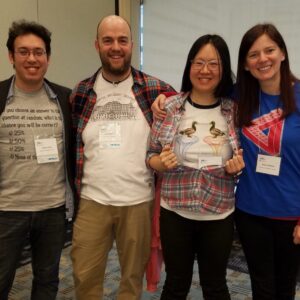 Authors:
Authors:
- Haley Skipper, she/her, Associate Teaching Professor, Interdisciplinary Arts and Sciences, University of Washington, Tacoma campus
- Alan Bartlett, Associate Teaching Professor, Interdisciplinary Arts and Sciences, University of Washington, Tacoma campus
- Yajun An, Assistant Professor, Interdisciplinary Arts and Sciences, University of Washington, Tacoma campus
- Ryan Card, Associate Teaching Professor, Interdisciplinary Arts and Sciences, University of Washington, Tacoma campus
Project Description
We designed a general education course focused in mathematical paradoxes for freshman that may not be going into a STEM-related field. We wanted to expose these students to topics in mathematics that they would otherwise not see, and in the hopes that they might realize mathematics could be interesting and useful for them. Paradoxes arise when naïve intuition leads to untenable conclusions, and this makes it perfect for introducing complicated topics without sophistication – we need them to make mistakes to understand the topic. This removes the penalty for being wrong and incentivizes learning in a subject notorious for right answers.
Project Question
We wanted to create a course to attract first-year students to science and mathematics curriculum regardless of their academic background by exposing them to a variety of challenging mathematical topics in a way that rewards explorations and naïve discussion. We hoped students would see that mathematics is mostly about finding useful ways to study and solve interesting problems and share them with others. Most importantly, we hoped they would learn that asking questions and challenging arguments is a wonderfully fruitful approach to learning.
Context
TCORE Intro to Science and Mathematics. Paradoxes: The Mathematics of Nonsense. The TCORE courses are offered under the Office of Undergraduate of Education and designed as a first-year experience for students to introduce them to college academics. The students typically do not have a strong STEM background and the course has no prerequisites. The course was designed for in-person active learning and peer collaboration, but it was also adapted for online and hybrid formats during the pandemic.
Methods
Paradoxes are statements leading to consequences that are strikingly counter to intuition or established results. Focusing on paradoxes exposed students to a number of topics without emphasizing a search for right answers but rather on good ways to understand problems. This encouraged students to approach problems from a naïve point of view and showed the value of diverse perspectives with content that is approachable for all students. We wanted students to learn that they could solve problems through critical thinking and academic inquiry while emphasizing understanding over computational proficiency. We explored all topics using worksheets designed to encourage active and collaborative learning, making the experience fun and impactful.
Impact/Assessment
The class had a significant impact on how students viewed the role of mathematics as it applied to their everyday life. In a pre-class survey where students were asked to describe how they used mathematics, almost all answered something along the lines of calculating payment, change, or tips. In a post-class survey student expressed the recognition that they saw mathematics everywhere. This included topics they were exposed to (such as logical fallacies, understanding data, discussion of social topics, recognizing patterns, art and perspectives, etc.) as well as things they began to see outside of their classrooms.
Course evaluations often expressed how students had to think deeper, having to change perspectives, and stretched their thinking. Another common theme involved being surprised frequently about both the content and how much fun they were having. One student even reported that “this class definitely took away the fear [they] had toward the subject.”
The course also offers a chance for students to express their knowledge through a creative project, such as designing board and card games, activities, and artwork that illustrated aspects of their assigned paradox or optical illusions. This gives students different ways to show what they learned that we wouldn’t see in a typical written final exam.
Application
Active learning and playing worksheets disguised as games works well to get students interested in topics that they may otherwise not be. Highlighting fundamental problems in your discipline by presenting something that has flaws allows students to wonder about and participate in the development of the topic. Exposing students to problems without clear solutions, encourages active inquiry rather than passive acceptance and forming careful hypotheses rather than drawing quick conclusions. Introducing material in a nonstandard way, students with apprehensions are caught off guard and can approach the subject with an open mind and curiosity rather than expectations.